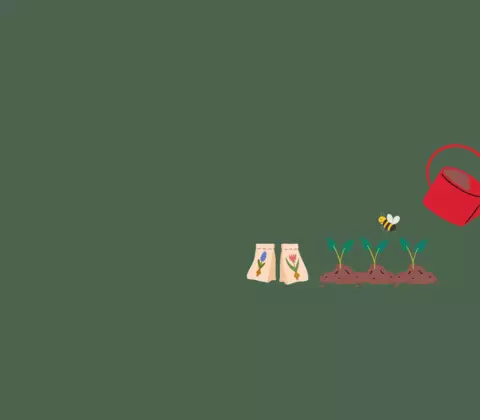
Growing tips
Thank you for downloading our growing guide! Below we’ve curated our top growing tips to help you on your growing journey. In our centres across the UK we use our green spaces to boost the physical and mental wellbeing of our service users, from school children with additional support needs to people experiencing mental health issues, growing your own has proven wellbeing benefits. We hope you enjoy our growing tips, and we would love to hear from you if you found them useful!
- Use banana water to give your plants a nutrients boost. Put your banana skins in a jug full of water, after 48 hours water your plants with the nutrient rich liquid.
- Sow more seeds than you need. More often than not, some of your seeds won’t germinate so sowing more will increase your chances of success. If you end up with too many seedlings you can share with friends, family, or neighbours.
- Grow flowers near your crops. Encouraging bees, butterflies and other insects is not only lovely to see but will also increase the chances of pollination.
- Water your green space first thing in the morning. This is the most effective time of day to water to prevent water evaporation as it ensures the water reaches the roots. Alternatively, water in the late afternoon or evening when the sun is going down.
- Sow seeds every two weeks. This will ensure you have crops throughout the growing season rather than only all at once.
- Scatter your coffee grounds on your crops. Not only does it deter slugs and snails, but it also releases nutrients into the soil.
- Grow your own tomatoes using the seeds from a store-bought one. Take the seeds from your tomato and place on a piece of kitchen paper for a couple of days until dried then sow as normal.
- Create your own seed depth measuring stick. So you don’t have to get your ruler out again you can just get a piece of wood and a permanent marker pen and draw lines at 5mm intervals. The next time you go to sow your seeds you can just pop your stick in the ground and go.
- Make a DIY mini greenhouse. If you want to get your seeds germinating faster or need to keep the seeds warm, then put a transparent plastic storage container over your pots. Alternatively you can use old plastic bottles as a mini greenhouse, simply cut the bottom half off the bottle and place over your pot.
- Save your vegetable water. Use the cooking water from vegetables on your plants as there are nutrients in the water that will act as a fertiliser.
- Eradicate weeds with cardboard boxes. If you’re struggling with weeds in your growing space, lay down a thick layer of newspaper or heavy duty flattened cardboard boxes to cover the space. Over time the lack of light and water will result in the weeds breaking down. Just remember to remove all staples and tape from the boxes and use weights such as stones on the corners to keep them from flying away in the wind.
- Store shop-bought herbs in water. If you buy unpotted herbs in the shops, take them out of the packet and store them in a glass of water. Not only will they last longer, but they often produce roots creating new plants. Keep refreshing the water and when the roots look developed enough, they can be potted to create a new plant.
One way that The Salvation Army helps to boost mental health and wellbeing is through gardening clubs. Our Lifehouse (hostel for people experiencing homelessness) has partnered with Fleetwood Town Football Club’s Community Trust to launch the Fleetwood Gardening Club. The Service Manager at Fleetwood Lifehouse told us: